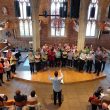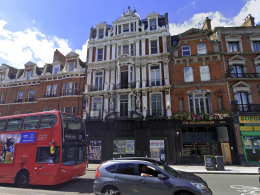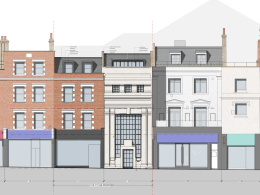Lord Gus O’Donnell’s controversial amendment to retrospectively validate the All England Lawn Tennis Club’s Wimbledon Park land purchase was abandoned in the House of Lords last night after the government rejected it and peers condemned it as an “erosion” of public rights.
Amendment 250 to the Planning and Infrastructure Bill was “not moved” by its sponsor, Lord Banner, following strong cross-party opposition and a government commitment to address the issue through future legislation with proper consultation.
The decision means Save Wimbledon Park’s legal challenge, scheduled for the High Court in January, remains on track. The amendment would have retrospectively validated Merton Council’s 1993 sale of the 73-acre former golf course to AELTC, potentially ending the community’s case before it reached court.
Lord O’Donnell, who confirmed he received an £86,000 payout from the disputed land while serving as an unpaid director of three AELTC companies, used the debate to defend the tennis club’s expansion plans as essential for “national well-being” and “economic growth.”
But peers from across the political spectrum rejected the amendment as a threat to green space protection nationwide, with Baroness Bennett of Manor Castle explicitly bringing “voices from the community, represented by the Wandsworth and Merton Green parties and Merton Friends of the Earth, which are strongly opposed to the development by the All England Lawn Tennis Club.”

Government rejects amendment
Government minister Baroness Taylor of Stevenage told the House the amendment “will not resolve this issue effectively” and would “create a contradiction to the procedures in the Local Government Act 1972” while “operating retrospectively, which could have unintended consequences.”
She repeated the government’s position from September’s Committee Stage debate, when ministers promised “full consultation” before reconsidering any law change – consultation that never took place before the amendment returned.
The minister announced a “wider review of existing protections” for public recreational space to “bring coherence to the legal framework, making protections more transparent and accessible, so communities can protect their most valued open spaces.”
She committed to “working at pace to find a solution that works for developers and councils while also safeguarding the local spaces that are most valued by communities” and promised to “seek to resolve this issue in future legislation.”
However, Baroness Taylor warned the amendment “does not provide robust safeguards to ensure local authorities are not incentivised to sell land without following the statutory consultation process” and would conflict with government priorities including increasing tree canopy cover and ensuring everyone lives within a 15-minute walk of green or blue space.

O’Donnell’s economic growth defence
Lord O’Donnell used the debate to make his first public statement on the amendment since it was revealed his AELTC directorships and financial connection to the land.
He complained the House of Lords’ decision in April to exclude non-financial interests from the register “has led to a degree of misunderstanding and, in some quarters, to unwarranted personal attacks on me.”
The former Cabinet Secretary said he asked the registrar’s office on 6 March whether he could continue including his AELTC role in the register but was told “this was not possible.”
“It is ridiculous, so I am stuck with this,” he told peers, adding: “This is the first time I have spoken on this issue.”
Lord O’Donnell defended the amendment as addressing “a new and retrospective uncertainty over land ownership, affecting potentially innumerable development sites across the country” following the Supreme Court’s 2023 Day v Shropshire ruling.
He argued the Wimbledon expansion, which already has planning permission upheld by the High Court, demonstrates the benefits of such development: “The project will convert 27 acres of private land into publicly accessible parkland—a 50% increase in green space for local residents.”
He claimed it would restore the “historic Capability Brown Wimbledon Park lake, which is terribly silted up at the moment” and deliver “the planting of at least 1,500 new trees and the creation of rich habitats for wildlife.”
“As someone who massively believes in green spaces and in well-being, I am afraid that I have to disagree with those who think that somehow this development will do the opposite of that,” he said.
Lord O’Donnell also stressed that Wimbledon “is not a profit-maximising organisation: 90% of our surplus goes back into the LTA and the other 10% goes into improving Wimbledon every year.”
He urged the government to act swiftly, saying: “I honestly do not understand why the Government, who accept that the current situation needs to be changed via legislation, cannot bring forward at Third Reading their own wording.”

Cross-party opposition
Multiple peers from across the political spectrum spoke against the amendment, raising concerns about erosion of green space protection and the difficulty of communities mounting legal challenges.
Baroness Young of Old Scone (Labour) said the amendment “has caused substantial concern that it erodes the protection of green space and removes long-standing public rights to green spaces, where the land is sold by local authority, with or without consultation.”
She challenged Lord Banner’s suggestion that judicial review provided adequate protection: “For the noble Lord, Lord Banner, to say that a judicial review is the way forward, frankly, misrepresents the position of many local communities, which are absolutely incapable of bringing a judicial review, either by degree of organisation or financially.”
Baroness Bennett of Manor Castle (Green) explicitly brought local community voices into the debate: “I bring voices from the community, something I often seek to bring into your Lordships’ House, as represented by the Wandsworth and Merton Green parties and Merton Friends of the Earth, which are strongly opposed to the development by the All England Lawn Tennis Club and opposed to the kind of changes that this amendment would bring.”
She warned the amendment represented “yet more loss of public good for private profit” and noted that 10% of what was public land in Britain—2 million hectares—had been transferred into private hands between the late 1970s and 2019.
Baroness Pinnock (Liberal Democrat) delivered an extensive critique of the lack of consultation: “You cannot make decisions of this enormity without proper, full consultation: listening to voices, hearing what they have to say, responding to them and not just doing a steamroller job, which too many developments seem to want to do.”
She said the failure to consult represented “the utter failure of what is happening, particularly in the Wimbledon Park issue.”
On judicial review, she said: “Call me cynical, but lawyers love people going to judicial review because it helps their income line.”
Baroness Hodgson of Abinger (Conservative) questioned the backdating: “If I have read this amendment correctly, it would appear to backdate this right. Surely that is very unusual and we ought to be looking to the future.”
Lord Lansley (Conservative) argued that while future consultation should be required, historic cases needed a different approach: “We have to look back and say, in all these decisions made over that period, where local authorities operated on what turned out to be a false basis, they must take into account the public benefit that might have been derived from the trust and find some other way of doing it.”
Lord Cromwell (Crossbench) said: “This smells a bit like that” – referring to scandals where “councils have sold them off for money, and we all complain that there are no more playing fields.”
He added: “The noble Lord, Lord O’Donnell, made a very powerful case for Wimbledon. Maybe he is right, but I am sure that plenty of sites around the country are not quite so green and lovely in their eventual outcome.”
Lord Lucas (Conservative) called the amendment “an undesirable bit of retrospective legislation designed to enable the All England Lawn Tennis Club not to have to negotiate fairly with the people it is disadvantaging as a result of its plans.”
He declared an interest as “a resident of Eastbourne, which has been disadvantaged by the All England Lawn Tennis Club’s plans.”

Conservative frontbench support
Baroness Scott of Bybrook, speaking for the Conservative opposition, supported the principle of the amendment while acknowledging the concerns raised.
She said: “We have seen too many examples of development being blocked after permission has been granted, based on historic technicalities.”
However, she acknowledged the amendment “would not change in any way the requirement for consultation” and that “if there is a change of use for any piece of land, planning permission will still be needed.”
She urged the government to bring forward a solution in the English devolution Bill, “which is in the other place and is likely to come here in the new year.”
Banner’s case for the amendment
Lord Banner argued the Supreme Court’s Day v Shropshire ruling had created “deeply unsatisfactory” uncertainty for land purchased in good faith, “sometimes decades ago.”
He stressed the amendment addressed developments across the country—citing Bristol, Winchester and Shrewsbury alongside Wimbledon—and would only apply to transactions made in good faith.
“Given that this amendment has been misunderstood by some and mischaracterised by others, I need to explain what it is and is not about,” he told peers.
He said the amendment would not remove consultation requirements, would not alter planning policy protections, and would not interfere with the right to judicial review within the normal three-month window.
Lord Banner indicated he might not press the amendment “depending on what the Minister says in winding up this debate” and expressed hope that “the reassurances she provides mean that I do not need to press the amendment now, although I really encourage as much pace as possible in dealing with this issue.”
Following Baroness Taylor’s response, he did not move the amendment.

What this means for Wimbledon Park
The decision to not move the amendment means Save Wimbledon Park’s legal challenge can proceed as scheduled in the High Court in January.
The campaign argues Merton Council’s 1993 sale of the former golf course violated consultation requirements under the Public Health Act 1875, meaning the statutory trust protecting the land for public recreation still applies.
If their case succeeds, it could potentially block the All England Club’s expansion plans for 38 additional grass courts on the site.
AELTC has launched its own legal proceedings against Save Wimbledon Park, arguing the Public Health Act protections do not apply to the land.
The club has also indicated, according to Save Wimbledon Park’s briefing to peers, that if this claim fails, it would seek to have the Supreme Court reverse its Day v Shropshire ruling.
Government’s promised review
Baroness Taylor announced the government would conduct a “wider review of existing protections” for public recreational space, acknowledging “the fragmentary and complex nature of existing legislation.”
She said: “We will aim to bring coherence to the legal framework, making protections more transparent and accessible, so communities can protect their most valued open spaces.”
The minister committed to resolving the issue “in future legislation” but did not specify which Bill or provide a timeline, despite Lord Banner suggesting the English devolution Bill as a vehicle.
She emphasised that “our cherished public green spaces must be protected for future generations, and we will need to find a solution that will balance this duty while enabling the development of land to house our young people and drive our economy.”
What happens next
With the amendment not moved, the Planning and Infrastructure Bill continues through the House of Lords without retrospective validation of the 1993 Wimbledon Park sale.
Save Wimbledon Park’s legal challenge will proceed to the High Court in January as scheduled.
The government has committed to bringing forward legislation addressing the issue in future, though no specific Bill or timeline has been announced.
Lord Banner and fellow sponsors retain the option to table the amendment again at a later stage, though the strength of opposition and government commitment to address the issue through proper consultation may make this unlikely.











It is irritating that Lord Gus O’Donnell repeated the oft-boasted claim of the AELTC that it, “is not a profit-maximising organisation: 90% of our surplus goes back into the LTA and the other 10% goes into improving Wimbledon every year.” Such a statement is a deliberate attempt to cast the AELTC as some kind of charitable organisation. But the LTA sold its 50% stake in the venue to the AELTC in 2008 in return for deferred payments amounting to 90% of annual profits until 2053. The AELTC is a profit-driven machine with dreams of unnecessarily tripling its size and selling an extra 8,000 expensive stadium tickets a day plus all the other revenues it could garner.
The offer of permissive access to a third of the 73 acres acres of Metropolitan Open Land is like robbing someone of their property and then claiming credit for giving them restricted use of a small part of it.
Thousands of us who value open land and public access are pleased that his selfish proposed amendment was rejected yesterday.
Thank you Paul, for such a clear and concise explanation of the facts surrounding a situation that is totally confusing to the average tennis fan or local resident. I do hope as many as possible will read it and understand why there is so much opposition, helped enormously by years of hard work and expertise by people who really care enough to see the right result for us all, now and in the future.